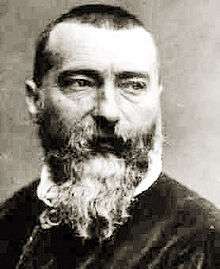Jean-Baptiste Alphonse Karr

Jean-Baptiste Alphonse Karr (24 November 1808 – 29 September 1890) was a French critic, journalist, and novelist. His brother Eugène was a talented engineer, and his niece Carme Karr was a writer, journalist and suffragist in La Roche-Mabile.
He was born in Paris, and after being educated at the Collège Bourbon, became a teacher there. Some of his novels, including his first, Sous les Tilleuls (1832), were autobiographical romances. A second novel, Une heure trop tard, followed next year, and was succeeded by many other popular works. His Vendredi soir (1835) and Le Chemin le plus court (1836) continued the vein of autobiographical romance with which he had made his first success. Geneviève (1838) is one of his best stories, and his Voyage autour de mon jardin (1845) was deservedly popular. Others were Feu Bressier (1848), and Fort en thème (1853), which had some influence in stimulating educational reform.
In 1839 Alphonse Karr became editor of Le Figaro, to which he had been a constant contributor; and he also started a monthly journal, Les Guêpes, of a keenly satirical tone, a publication which brought him the reputation of a somewhat bitter wit. His epigrams are frequently quoted, for example "plus ça change, plus c'est la même chose"[1]—"the more it changes, the more it's the same thing", usually translated as "the more things change, the more they stay the same," (Les Guêpes, January 1849). On the proposal to abolish capital punishment, "je veux bien que messieurs les assassins commencent"[2]—"let the gentlemen who do the murders take the first step".
In 1848 he founded Le Journal. In 1855 he went to live at Nice, where he indulged his predilections for floriculture, and gave his name to more than one new variety, notably the dahlia (New International Encyclopedia). Indeed he practically founded the trade in cut flowers on the French Riviera. He was also devoted to fishing, and in Les Soirées de Sainte-Adresse (1853) and Au bord de la mer (1860) he made use of his experiences. His reminiscences, Livre de bord, were published in 1879–1880. He died at Saint-Raphaël (Var).
His short story Les Willis was the basis of Giacomo Puccini's opera Le Villi.
The bamboo species Bambusa multiplex Alphonse Karr was named in his honour.[3]
Novels

- Sous les Tilleuls (1832)
- Une heure trop tard (1833)
- Vendredi soir (1835)
- Le chemin le plus court (1836)
- Geneviève (1838)
- Voyage autour de mon jardin (1845)
- Feu Bressier (1848)
- Fort en thème (1853)
- Les Soirés de Sainte-Adresse (1853)
- Histoires Normandes (1855)
- Au bord de la mer (1860)
- Une poignee de verites (1866)
- Livre de bord (1879–80)
![]() This article incorporates text from a publication now in the public domain: Chisholm, Hugh, ed. (1911). Encyclopædia Britannica (11th ed.). Cambridge University Press.
This article incorporates text from a publication now in the public domain: Chisholm, Hugh, ed. (1911). Encyclopædia Britannica (11th ed.). Cambridge University Press.
External links
References
| Wikiquote has quotations related to: Alphonse Karr |
| Wikimedia Commons has media related to Alphonse Karr. |
- Works by Alphonse Karr at Project Gutenberg
- Works by or about Jean-Baptiste Alphonse Karr at Internet Archive
|